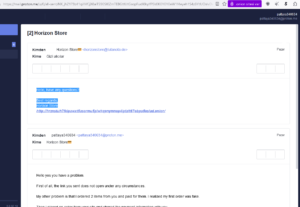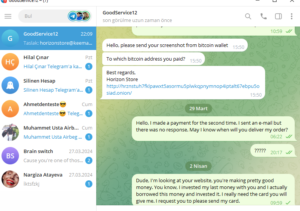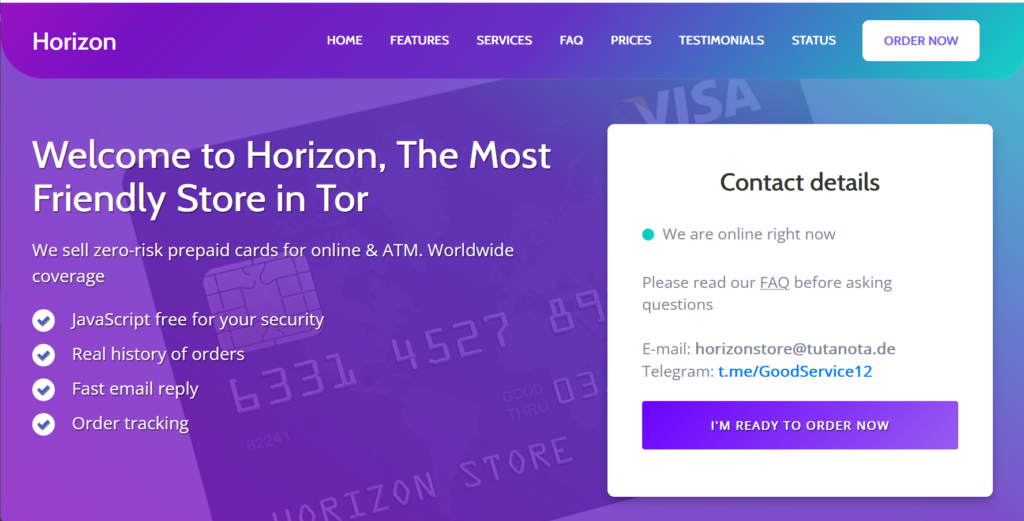Table of Contents
ToggleHorizon Store – TOR Scam Report (1)
Onion Link: http://hrznstuh7fklpawxt5asormu5plwkqpnymnop4iptalt67ebpu5osiad.onion
Scam Report Date: 2024/03/28
Client Scam Report Breakdown
Original Report Summary:
The client begins by stating, “I bought a card from Horizon website. It’s worth $119.” This establishes that the transaction took place on the Horizon website, where the client purchased what seems to be a prepaid or gift card for $119. The client initiated contact with the vendor through Telegram, a popular encrypted messaging app. This platform is frequently used in online markets, particularly in less regulated environments like deep web marketplaces. The client mentions, “They responded to my first Telegram,” which suggests initial responsiveness from the vendor, creating an expectation of legitimate business conduct.
Photos:


Here, it’s crucial to understand the significance of platforms like Horizon and Telegram in this context. Horizon appears to be an online storefront that likely operates in a gray market or illegal market, often associated with digital or physical goods traded anonymously. Telegram, meanwhile, is a popular communication tool in these settings due to its encrypted messaging features, which protect users’ identities and provide privacy. However, these same features can facilitate scams, as unscrupulous vendors may take advantage of the lack of regulation and the difficulty in tracing communications or transactions.
Payment and Lack of Response
Following initial communication, the client explains that they “made the payment and shared the information with them.” However, despite following the expected steps, the vendor did not deliver the product. The client emphasizes that “it has been almost a month and they still haven’t given me my order, they don’t respond to the goods.” This is a clear breach of trust in the transaction. The expectation when purchasing goods is that payment secures delivery, but in this case, the vendor has ceased all communication. The extended time frame (nearly a month) without any resolution or update indicates a deliberate intention to defraud the buyer.
The lack of response after payment is a common tactic used by scam operations. Once the money is transferred, typically through untraceable methods like cryptocurrencies or prepaid services, vendors often go silent. The use of phrases like “they don’t respond to the goods” illustrates that the client has made repeated attempts to communicate but has been ignored, further confirming that they have been scammed. The fact that communication occurred via Telegram is another indicator of how these environments allow vendors to disappear after a transaction without repercussions.
Warning and Call to Action
In the final portion of the report, the client asserts, “These are scams, it would be important for you to share them.” This line serves as both a warning to potential future buyers and a call to action for the wider community. The client intends to “share these on all sites,” reflecting their desire to protect others from falling victim to the same scam. By spreading the information, the client aims to increase awareness and prevent the vendor from deceiving other buyers.
The report highlights a broader problem with these marketplaces: the lack of accountability. Platforms like Horizon typically lack oversight, and while communities can attempt to self-regulate by sharing scam reports and warnings, the decentralized and anonymous nature of these spaces makes enforcement difficult. The term “scam” is used in the context of fraudulent business dealings, where a buyer is deceived into parting with their money without receiving the promised product or service. The client, through their warning, is encouraging others to be cautious when dealing with such vendors, particularly when transactions occur in environments that lack regulatory protection or consumer guarantees.






